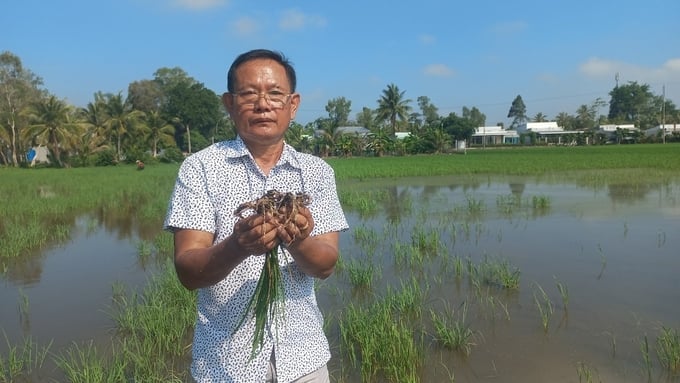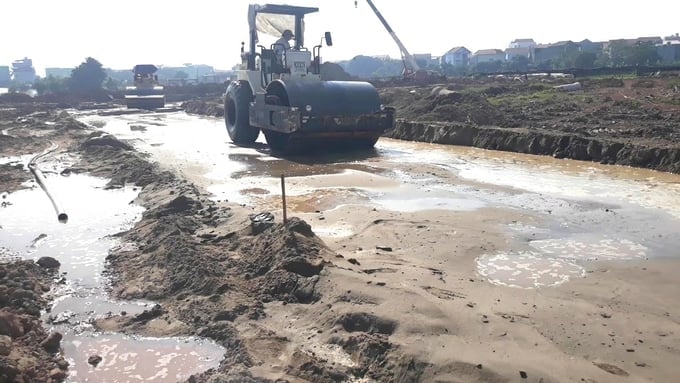May 17, 2025 | 05:25 GMT +7
May 17, 2025 | 05:25 GMT +7
Hotline: 0913.378.918
May 17, 2025 | 05:25 GMT +7
Hotline: 0913.378.918
In compliance with the Prime Minister's directive in Official Dispatch No. 3888/VPCP-CN dated 06/05/2024, from the Government Office regarding Professor Nguyen Ngoc Tran's report on the pilot use of sea sand as a fill material for key transportation projects, the Ministry of Agriculture and Rural Development (MARD) assessed the impact of using sea sand as a fill material for the North-South Expressway project on the winter-spring 2023-2024 and summer-autumn 2024 rice crops.

The use of sea sand as fill material for the North-South Expressway project in Vi Thuy district, Hau Giang province has caused damage to approximately 5.5 tons of rice. Photo: Van Vu.
For the winter-spring rice crop, after receiving local reports that using sea sand as a road base could affect rice growth and yield, on March 15, 2024, the Plant Protection Department of Hau Giang Province's Department of Agriculture and Rural Development surveyed and tested the salinity levels in the affected rice fields (suspected of salt contamination).
The results showed that the impact area included 9 households with more than 3 ha of summer-autumn rice in Ap 9, Vi Thang commune, Vi Thuy district, Hau Giang province. This area is adjacent to the Hau Giang - Ca Mau section of the North-South Expressway project, phase 2021-2025.
Regarding salinity, the salinity level of the damaged rice field was 2.5‰, while the salinity level of water in unaffected fields was 0.1‰. According to the base standard on salt tolerance threshold, TCCS 01:2024/TT issued on April 19, 2024, by the Plant Protection Department of the Ministry of Agriculture and Rural Development, the salt tolerance threshold for some agricultural crops, including rice, is 1.28‰.
The affected rice field area is 2.23 ha with a production of 13.49 tons and a yield of 6.04 tons/ha, compared to a normal yield of 7.6 tons/ha.
According to the Ministry of Agriculture and Rural Development, the estimated loss is 5.5 tons of rice compared to unaffected fields in the same area. The construction unit has compensated the farmers for the total loss with an amount of VND 43.98 million.

The salinity level measured in the dead rice field was 6.6‰, at the highway roadbed it was 1.8‰, and at the irrigation canal, it was 0.4‰.
For the summer-autumn crop, on May 10, 2024, after receiving a document from the People's Committee of Vi Thang commune, Vi Thuy district, Hau Giang province, regarding the potential impact of using sea sand as road fill on rice growth and yield, the Hau Giang Department of Agriculture and Rural Development organized a team to inspect the rice fields near the North-South Expressway project section in Vi Thang commune.
The results showed that the rice was in the growth stage 20-25 days after sowing, with some areas experiencing 70% mortality and other areas affected by 20-50%. The salinity level measured in the dead rice field was 6.6‰, at the highway roadbed it was 1.8‰, and at the irrigation canal, it was 0.4‰.
In response, the Ministry of Agriculture and Rural Development proposed that the Prime Minister direct the Ministry of Transport to require construction units to implement specific measures to ensure that the salinity level of the water at the construction site meets the standards set by the Ministry of Agriculture and Rural Development in Decision No. 179/QD-TT-DMT dated 04/19/2024.
Translated by Hoang Duy
![Multi-channel, multi-directional Vietnamese agricultural markets: [7] Deep processing makes global reach easy](https://t.ex-cdn.com/nongnghiepmoitruong.vn/608w/files/huytd/2025/05/16/2946-che-bien-sau-chia-khoa-vang-nang-tam-nong-san-viet-tren-ban-do-the-gioi-080603_110-093858.jpg)
(VAN) The application of deep processing technology is helping Vietnamese agricultural products enhance their value, create competitive advantages, and open doors to conquer global consumers.
![Multi-channel, multi-directional Vietnamese agricultural markets: [6] Agri products go online](https://t.ex-cdn.com/nongnghiepmoitruong.vn/608w/files/content/2024/12/10/1-113313_954.jpg)
(VAN) Bringing agri products onto e-commerce platforms is an effective way to build a brand that many businesses, cooperatives, and agricultural production households are doing.

(VAN) Veterinary training should focus on quality, not just quantity. Veterinarians also need more options to pursue specialized training.

(VAN) The veterinary industry needs to be viewed objectively and further invested in to properly demonstrate its role and importance in the new context.

(VAN) The number of veterinarians graduating each year is not enough to meet actual needs, hence a difficult problem for the growing livestock industry.

(VAN) The strategic partnership between Cambodia, the Philippines, Vietnam, and CGIAR ensures that innovative solutions effectively address national priorities for food system development.

(VAN) This was affirmed by the UK Minister of State at the Department for Environment, Food and Rural Affairs during a working session with Deputy Minister Tran Thanh Nam on May 13.